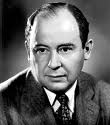-
(b.) -1903 December 28(d.)1957 February 08
Bio/Description
Hungarian-American mathematician who made major contributions to a vast range of fields, including set theory, functional analysis, quantum mechanics, ergodic theory, continuous geometry, economics and game theory, computer science, numerical analysis, hydrodynamics (of explosions), and statistics, as well as many other mathematical fields. He is generally regarded as one of the greatest mathematicians in modern history.[2] The mathematician Jean Dieudonn? called von Neumann "the last of the great mathematicians", while Peter Lax described him as possessing the most "fearsome technical prowess" and "scintillating intellect" of the century. Even in Budapest, in the time that produced geniuses like von K?rm?n (b. 1881), Szil?rd (b. 1898), Wigner (b. 1902), and Teller (b. 1908), his brilliance stood out.[5]
Von Neumann was a pioneer of the application of operator theory to quantum mechanics, in the development of functional analysis, a principal member of the Manhattan Project and the Institute for Advanced Study in Princeton (as one of the few originally appointed), and a key figure in the development of game theory[1][6] and the concepts of cellular automata[1] and the universal constructor. Along with Edward Teller and Stanislaw Ulam, von Neumann worked out key steps in the nuclear physics involved in thermonuclear reactions and the hydrogen bomb.
-
Date of Birth:
1903 December 28 -
Date of Death:
1957 February 08 -
Gender:
Male -
Noted For:
One of the greatest mathematicians in modern history -
Category of Achievement:
-
More Info:


